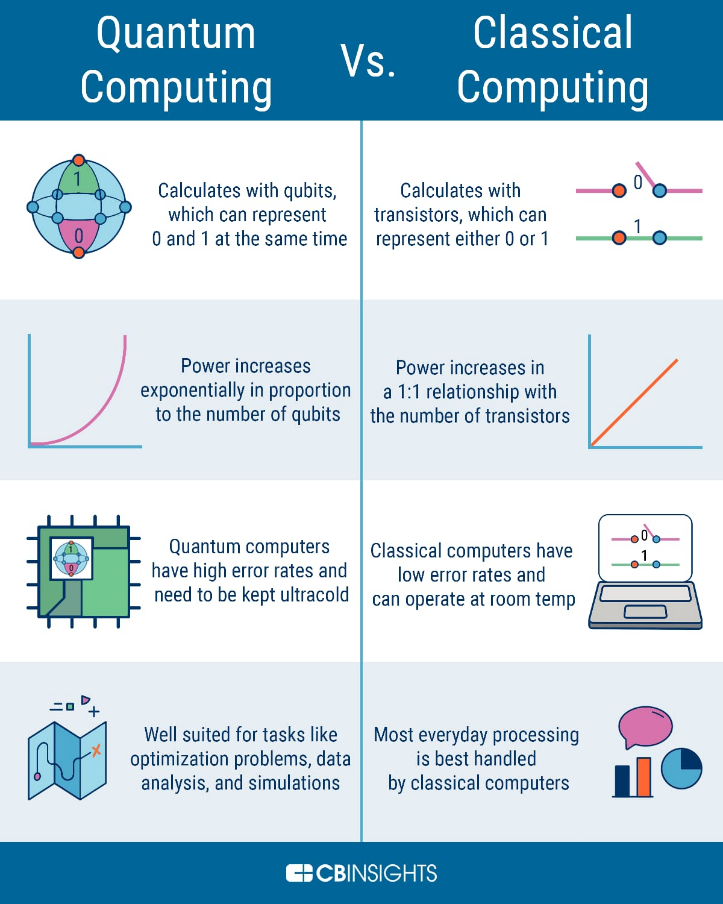Rohit Kumar is responsible for Researchwire European & North American business. He is an HEC, Paris 2008 MBA and Indian Institute of Technology (IIT) Kharagpur 2002 engineering graduate with close to 17 years of experience in business innovation and strategy, business development and client relationship roles. He is working with ResearchWire since 2016 and as a partner, is responsible for the growth of ResearchWire in Europe and North America.
Prior to ResearchWire, Rohit was handling sales strategy and pricing for Syniverse Technologies, a telecom services provider, where he was instrumental for growth in EMEA and India through product innovations, creative pricing and discounting models and executing strategic sales plans.
Rohit is based out of Luxembourg and has been living in Europe for last 12 years. He understands European & North American customers and their needs and ensures that our customers always have a local person to reach out whenever needed.
Quantum computing is the disruptive buzzword in research, engineering, technology, and science today. A fascinating interdisciplinary field that combines computer science, physics, and mathematics using quantum mechanics principles to solve complex mathematical models that classical computing cannot perform. Simply put, it involves a type of computer that is nearly 158 million times faster than the most sophisticated supercomputer.
To give a perspective, it can be used as a powerful solution for encryption methods that have taken several years to solve, even by supercomputers. With quantum computing, these problems could be solved in less than an hour. Or consider complex problems like the need for a tool to model a single protein and deactivate, after the Covid-19 crisis. Quantum computing is a suitable choice for solving non-linear problems.
How Quantum Computing is better than classical computing?
The truth is classical computing can solve all problems as quantum computing. The only difference lies in the unique ways of manipulating data to obtain two fundamentally different solutions.
 By imagining a traveling salesman who needs to visit several supermarkets while covering the shortest distance or time, without backtracking, the concept is exemplified. Basic mathematics reveals that when there are more than a handful of supermarkets, the possible routes escalate to an enormous number, often reaching millions or billions. Thus, determining the shortest distance and time for all of them using traditional binary computing requires significant processing power.
By imagining a traveling salesman who needs to visit several supermarkets while covering the shortest distance or time, without backtracking, the concept is exemplified. Basic mathematics reveals that when there are more than a handful of supermarkets, the possible routes escalate to an enormous number, often reaching millions or billions. Thus, determining the shortest distance and time for all of them using traditional binary computing requires significant processing power.
Quantum Computing harness the laws of quantum mechanics to accelerate processing power to solve problems that are beyond the purview of classical computing. Classical computers perform operations using bits, which are binary units of information that can either be 0 or 1. In contrast, quantum computers use quantum bits, or qubits, which can exist in multiple states at the same time, allowing quantum computers to perform multiple calculations simultaneously.
Quantum computing uses Superimposition and Entanglement that enables qubits to be interconnected and allows it to exist in multiple states on a quantum computer, allowing them to share information instantaneously.
Limitations of Quantum Computing
Quantum Computers are difficult to build, engineer and program. It is also not one of the easiest technologies to get around. There are other challenges of quantum computing too.
To begin with, there are certain urgent physics-related obstacles that require resolution. Qubits, which are necessary for data representation and computation in quantum computing, are inherently unstable when in a physical state. As a result, they need to be kept in an extremely cold environment to maintain their stability, even if it’s only for a brief period of a few nanoseconds. Consequently, quantum computing is presently prohibitively expensive, and only the most well-funded research institutions and largest corporations can afford to possess them.
Additionally, there is a notion that cosmic rays may impede the broad adoption of quantum computing. Furthermore, errors resulting from such phenomena, which can impact even classical computing, could have a more significant impact on the highly sensitive engineering required to effectively utilize qubits at a large scale. There’s also a limited talent pool with the skills to develop and work with quantum computing.
Currently, the most significant issue is the threat that quantum computing poses to encryption. Digital cryptography is presently employed to safeguard all our online activities, communication, and information, including military, commercial, and national secrets. It functions based on the notion that encryption techniques are exceedingly complex, making it practically impossible for classical computers to break them via brute force, which would entail trying out every possible password or key over millions or billions of years.
Regular perception is that if something encrypted takes millions of years to be broken, quite likely that they won’t care much. This task, however, may be trivial for quantum computers. That’s where the problem lies.
Future of Quantum Computing
The initial advancements we anticipate witnessing are expected to resemble the historical developments that occurred when classical computers transitioned from experimental tools or exclusive possessions of large corporations in the latter part of the 20th century. This shift is likely to follow the pattern of the progression from mainframes that occupied entire buildings to minicomputers that occupied rooms and ultimately to microcomputers that could be placed on our desks. Quantum Computing could be a game-changer in several fields like healthcare, national security, cybersecurity, cryptography, and others. It has the potential to challenge our fundamental understanding of reality.
This democratization of quantum computing accessibility will enable businesses to utilize it to address their unique challenges, resulting in the emergence of novel applications. Leading the quantum computing industry are companies such as Google, IBM, Rigetti Computing, IonQ, D-Wave Systems, Alibaba, Xanadu and Honeywell.
Possible future applications of quantum computing

Quantum computers can aid in enhancing the batteries of electric vehicles. Notably, automotive manufacturers such as Volkswagen and Daimler are utilizing quantum computers to simulate the chemical makeup of batteries for electric vehicles.
Pharmaceutical firms employ quantum computing to examine and compare compounds that have the potential to give rise to novel drugs. Due to their capacity to process numerous potential solutions at an exceedingly high speed, quantum computers can be utilized for optimization tasks. Airbus, a multinational European aerospace firm, is leveraging quantum computing to assist in computing the most economical fuel usage ascent and descent paths for their aircraft.
The realm of cybersecurity is being transformed by quantum computing as it has the potential to decipher all the present encoding and encryption methods. The capability of quantum computers to perform intricate simulations in parallel enables them to function much faster than classical computers. This parallel simulation capacity allows quantum computers to rapidly identify solutions to complex issues. Industries such as finance, healthcare, and education will be disrupted by the emergence of quantum computing.
Quantum computing has significant advantages in marketing tasks such as simulation, prediction, and optimization. However, only a handful of marketing teams utilize these techniques due to the enormity of options and choices that exceed current computing capabilities.
Artificial Intelligence is poised to be one of the primary beneficiaries of quantum computing. Quantum computing has the potential to enhance learning and interpretation algorithms. However, AI is already transforming numerous industries.
Quantum Computing in Intellectual Property
Intellectual property is critical to business as it provides legal protection for ideas, unique products and services, revenue generation, investor attraction, business valuation enhancement, and establishing the market position of businesses that include patents. These legal protections give any business the exclusive right to use, sell, or even license their ideas, which can give them a significant competitive edge in the market.
The importance of IP in business can be evaluated in many ways.
-
Protect unique products and services:
IP protection can help businesses safeguard their unique products and services from competitors.
-
Revenue generation:
IP can be licensed or sold to generate additional revenue for businesses.
-
Attracting investors:
Strong IP protections will attract investors by demonstrating that a business has valuable intellectual assets for investment.
-
Enhancing business valuation:
IP protection can significantly increase the value of a business by providing a competitive advantage and generating more revenue streams.
-
Establishing market position:
IP helps businesses to establish themselves in the market by providing legal protections for their innovative product or ideas. This can set them apart by giving them an edge over competitors.
In this context, quantum computing has the potential to create an impact on many industries, such as cryptography, drug discovery, material science and machine learning.
- Quantum computers are expected to break encryption algorithms that are being used to secure data today. This can have a severe impact on cybersecurity and privacy of companies.
- Quantum computing can open new avenues for IP creation and protection. For example, it can be used to design and optimise newly discovered materials with unique properties. These could be patented or otherwise protected under an IP law.
- Quantum machines can produce more learning algorithms that can be used to develop innovative AI applications that are protected under IP law.
- Quantum computing technology is developing at a fast rate and will be important for businesses and organisations to be informed about the potential IP implications and to develop strategies to protect their IP rights in this ever-changing complex landscape.
Quantum computing is expected to enable fast optimisation of complex systems, which could lead to better growth in logistics, finance, and transportation.
Conclusion
Although the extent of quantum computing’s impact on marketing in the future remains uncertain, there are already significant applications in place. One instance is ad targeting, where corporations can analyse vast amounts of customer behaviour data with remarkable accuracy by processing it through quantum computing. It has immense potential in the world of technology. Although there are various advantages to classical computing, if you aspire for ground-breaking advancements, they are unlikely to occur. This is the thrill of quantum computing.



